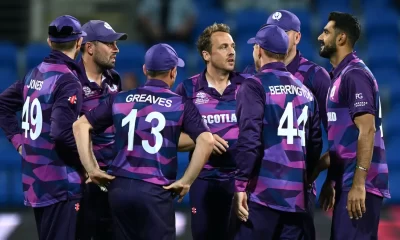
Table of Contents
In a bittersweet conclusion to the Cricket World Cup Super League, Ireland and Bangladesh are locked in a three-game series devoid of their passionate home crowds. What was intended to revitalize men’s international 50-over cricket and infuse relevance and context into the bilateral ODI series has arrived at a quiet denouement in the tranquil environs of Chelmsford, east of London.
Due to weather and financial concerns, Ireland reluctantly plays ‘host’ in the UK, leaving captain Andrew Balbirnie to express his longing for the emotional support of their Irish faithful. “While Essex has been accommodating, nothing compares to the joy of playing home games in Ireland, surrounded by our ardent fans, friends, and family,” Balbirnie confessed with a tinge of disappointment.
This underwhelming climax befalls a competition whose fate was sealed by the International Cricket Council (ICC) in November last year. The governing body announced a return to the previous system of World Cup qualification based on team rankings for the lead-up to the 2027 event, effectively relegating the Super League.
Launched in July 2020, the Super League aimed to provide each of the ICC’s 12 full members, along with a qualifier (the Netherlands for this cycle), the opportunity to engage in four home and four away series. The top seven teams, alongside hosts India, would earn coveted berths in the 2023 World Cup. The remaining five teams would face a final chance to qualify through a 10-team tournament in Zimbabwe in June-July this year.
On the surface, the Super League achieved its objective of streamlining the understanding of the significance of each ODI series and fostering a fairer World Cup qualification system. Ireland, in particular, has a lot riding on the final series, as a clean sweep against Bangladesh could secure their World Cup spot. Furthermore, they would need to bolster their net run rate to surpass South Africa and claim the eighth position in the Super League standings.
This potential triumph would be well-deserved for Ireland, having achieved victories over formidable opponents such as South Africa and England throughout the cycle. In contrast, previous World Cup champions West Indies and Sri Lanka have faltered, facing the arduous task of battling through the qualifier tournament to secure their World Cup berths.
Also, read: Watch Babar Azam’s shirt he received on 100th ODI
Despite the challenges posed by the pandemic, the Super League demonstrated resilience. While many series were postponed, alternative windows were found, as evidenced by the Netherlands recently ‘resuming’ their series against South Africa, a remarkable 16 months after departing due to a new Covid strain.
Nonetheless, the conclusion of the Super League leaves four series unplayed, compromising its intended objectives. Three of these cancelled series involved Afghanistan, which was set to host Australia and Pakistan and tour India during the three-year cycle. Australia opted out of their planned ODI tour of the UAE to face Afghanistan. At the same time, Pakistan saw no value in playing their bilateral series when both sides had already secured World Cup qualification. Consequently, three T20 matches took place in Sharjah instead.
“We found no allure in playing the (ODI) series. It primarily revolved around Super League points. Now, regardless of the victor, it holds no significance,” remarked Pakistan Cricket Board chairman Najam Sethi in January, offering insight into their decision.
The scheduled India-Afghanistan ODIs never materialized, though the Board of Control for Cricket in India (BCCI) has hinted at a possible tour in June, long after the conclusion of the Super League. By defeating the Netherlands, Ireland, and Zimbabwe, Afghanistan has already secured their World Cup qualification. However, they faced defeat against another qualified team,
One of the most perplexing aspects of the Super League for cricket enthusiasts has been the abundance of 50-over matches played outside the ICC’s World Cup qualification framework. In the past 12 months, Australia has participated in 11 ODIs with no Super League points, including encounters with Sri Lanka, England, and India. In contrast, they only played 18 matches that contributed to the Super League standings over the entire three-year competition.
Conversely, India has been even more prolific, engaging in a staggering 21 ODIs that were not associated with Super League points since the tournament’s inception in July 2020. This is equal to the number of ODIs they played that did contribute to the Super League points. England, West Indies, New Zealand, and Sri Lanka have also participated in many of what some might label as ‘meaningless’ one-day fixtures.
Looking ahead, the landscape of ODI cricket post the 2023 World Cup may witness significant transformations. Pakistan, for instance, currently only has one bilateral 50-over series scheduled on the Future Tours Programme for the next 18 months, which is against Afghanistan. Given the chairman’s stance on the relevance of these fixtures, even this series could be in jeopardy. With a crowded international calendar and the burgeoning popularity of domestic T20 leagues, it might serve as a precursor to the evolving future of the sport.
As the curtains draw to a close on the Cricket World Cup Super League, the ambitious endeavour to inject vigour into men’s international 50-over cricket finds itself falling short of its envisioned impact. Despite its noble intentions, the abrupt conclusion of the competition and the existence of unplayed series have unveiled the challenges in crafting a comprehensive and universally embraced qualification framework.
The cricketing world now turns its attention to the upcoming World Cup, where teams will vie for supremacy on the grand stage. While the Super League may have yet to realize all its aspirations, it did offer glimpses of its potential. It showcased the competitiveness and determination of teams seeking to secure their place among the elite.
As cricket enthusiasts reflect on the Super League’s journey, they are left pondering the future direction of the sport and the strategies needed to invigorate and captivate audiences in an ever-evolving landscape.
Also, see:
Ben Stokes announces retirement from ODI Cricket












